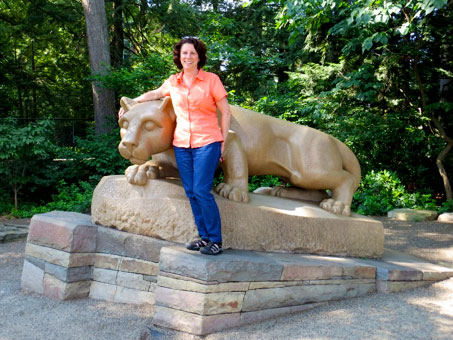
M.Ed. in Earth Sciences at Penn State’s World Campus Student Profile: Sharon Dykhoff
Year graduated: 2017
Hometown: Reston, VA
Profession: Middle and high school science teacher at independent school in Washington, D.C. area
- Why did you decide to get your masters and why with the M.Ed. in Earth Sciences program at Penn State’s World Campus?
- I resumed my teaching career after more than 20 years at home with my children. In that time, I had also moved to a new state, so I wanted to pursue some sort of continuing education to reinstate my teaching credentials. I also wanted to update my skills and knowledge in the sciences so I would be a better teacher. Teaching has become a more competitive employment field since I finished my undergrad studies, and the M.Ed. in Earth Sciences will make me a more attractive candidate to potential employers.
I guess you could say that my educational roots are in State College, PA, where I began my schooling as a kindergartner while my father pursued his PhD in chemistry at Penn State in the 1960s. In 2013, I came back to Penn State with my parents to celebrate the 50-year anniversary of my father’s PhD. As part of the celebration, we attended a dinner featuring some graduate student research at Penn State where I learned about the PSU World Campus. The M.Ed. in Earth Sciences Program met my needs as a science teacher and was a perfect fit for my experience and interests. I wasn’t sure if I would like distance learning because I enjoy face-to-face learning, but my World Campus teachers integrate a variety of ways for the students to interact with each other using discussion boards and video-conferences. Also, the teachers are very responsive to the students. Although Penn State is a large university, the World Campus community in the M.Ed. in Earth Sciences program is an intimate one, and I’m able to form relationships with the professors and fellow students. I also have the unique opportunity to interact with science teachers from all over the country. - How has this degree impacted your career?
- This program has revitalized my teaching. One of the best aspects of this program is the emphasis on the sciences. From earthquake prediction to climate change, to the new field of Critical Zone science, the classes in the M.Ed. program have prepared me to teach my students about the latest research and information in the earth sciences. Certainly the content of the classes has brought me “up to speed” on current knowledge in the earth sciences, but more importantly, the education-focus of the classes has exposed me to creative and innovative ways to teach my students skills beyond the content. I have learned how to integrate authentic research and data analysis into my lessons. One aspect of the M.Ed. classes that I especially appreciate are the capstone projects. In each of my science classes in the program, I have created lessons and unit plans that I actually use in my teaching. A data analysis activity that I wrote as part of one capstone project was recently published on a science education resource website.
- What was a highlight or opportunity from the program for you?
- While taking Earth 530 on Critical Zone science, I learned about a summer Research Experience for Teachers at Penn State. This unique experience allowed me to spend 8 weeks on campus working with some of the Critical Zone scientists whose research I had studied in Earth 530. Mainly I worked with Dr. Susan Brantley’s team in the Earth and Environmental Systems Institute at Penn State on a project to understand water quality impacts from hydrofracturing. I also worked with another teacher in the program to create virtual fieldwork experiences on Critical Zone research at the Susquehanna Shale Hills Critical Zone Observatory.
- What advice can you give students considering this program?
- The program is structured well, so you can pursue your degree while continuing to teach and work, and you’ll be able to create curricula that you can use in your classroom. You’re able to learn from highly respected professors and scientists while engaging with teachers from all over the world.
- What do you like to do in your free time?
- I enjoy hiking, camping, and spending time with my family. I also like to volunteer with citizen science projects, especially when I can do them while hiking and camping with my family!